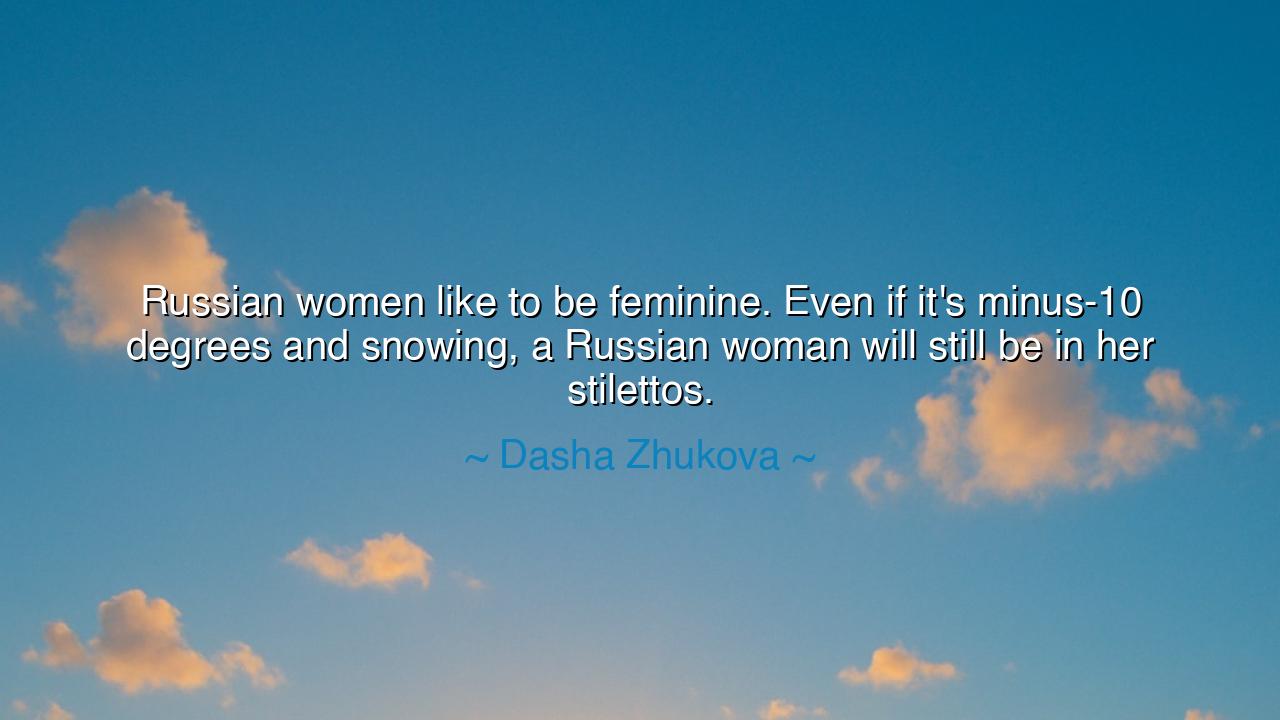
Russian women like to be feminine. Even if it's minus-10 degrees
Russian women like to be feminine. Even if it's minus-10 degrees and snowing, a Russian woman will still be in her stilettos.






The words of Dasha Zhukova — “Russian women like to be feminine. Even if it’s minus-10 degrees and snowing, a Russian woman will still be in her stilettos.” — gleam with both admiration and revelation. They speak not merely of fashion, but of a spirit that defies hardship with grace, that meets the cruelty of winter with the elegance of dignity. In these words, Zhukova uncovers a truth about identity: that for many, femininity is not a luxury of circumstance, but a declaration of strength.
The meaning is layered. To step into stilettos when the earth is buried in ice is more than vanity — it is a refusal to be subdued by the environment. It is an act of quiet defiance, a testament that beauty and feminine expression can coexist with endurance. The Russian woman, through this symbol, becomes a figure of resilience: even amid snow and frost, she carries herself with power, refusing to let hardship strip away grace.
History offers a grander mirror to this truth. Recall the days of the Siege of Leningrad in the Second World War, when starvation and bitter cold weighed upon the people. Even then, accounts tell of women who sought to preserve fragments of beauty — a ribbon in the hair, a touch of color upon the lips — as though to say: we are more than our suffering, and even in despair, we shall carry ourselves with dignity. Their perseverance gave courage to all, reminding the city that humanity’s spirit could not be broken by frost or famine.
Zhukova’s words, though modern, echo the ancient understanding that femininity is not weakness but strength disguised in elegance. To uphold grace under duress is an act of quiet heroism, a way of saying that the soul remains sovereign, even when the body is tested. The stilettos in the snow are not only shoes — they are a banner, a symbol of endurance clothed in beauty.
Let this be a lesson for the generations: in every culture, in every land, there are those who meet hardship not only with grit but with style, not only with resilience but with beauty. The Russian woman in her stilettos teaches us that identity is not surrendered to circumstance; it is proclaimed in spite of it. Thus, through frost and storm, she becomes an emblem of strength adorned with elegance, carrying forward the eternal truth that dignity, once claimed, cannot be defeated.






KNKhuyen Nguyen
While this quote certainly paints a vivid picture of resilience and commitment to style, it raises an important question about the limits of such dedication. Should women be expected to endure discomfort or even pain to maintain an ideal of beauty or femininity? Does this expectation apply to all women, or is it tied to particular cultural standards that only some are willing or able to follow? Where do we draw the line between personal style and societal obligation?
DKHo Duy Khang
This comment made me think about the pressures of femininity in different cultures. In many societies, women are expected to look 'polished' no matter the weather or circumstances, which can feel like a daunting task. Does the desire to look feminine, as Dasha Zhukova suggests, stem from a place of empowerment, or is it more about conforming to societal expectations that limit personal expression? How much freedom do women really have to define what femininity means for them?
Mmakemovie
This quote seems to suggest that femininity, in some places, is more about how you present yourself than what you actually feel. Are women in Russia, or any other cultures with similar ideals, constantly facing the challenge of meeting such external expectations? Does this ever affect how women perceive themselves, especially when what is seen as 'feminine' might not always align with their own comfort or identity?
TLTHUY LINH
I find it fascinating how fashion can be a cultural statement, especially in places like Russia, where there seems to be an emphasis on maintaining a particular image. But does this mean Russian women are expected to sacrifice comfort for appearance? What happens when someone chooses practicality over this idealized form of femininity? Is there space in society for diverse expressions of femininity that don't require physical sacrifice?
DM20. Duy Manh
The image of a woman braving harsh weather in stilettos for the sake of maintaining femininity is both intriguing and a bit alarming. How do women reconcile the physical discomfort of wearing impractical shoes in such cold conditions with the cultural importance of appearing fashionable? I can't help but think this might be more about the pressures of beauty standards than genuine personal comfort. Does this create a disconnect between physical well-being and outward appearance in society?